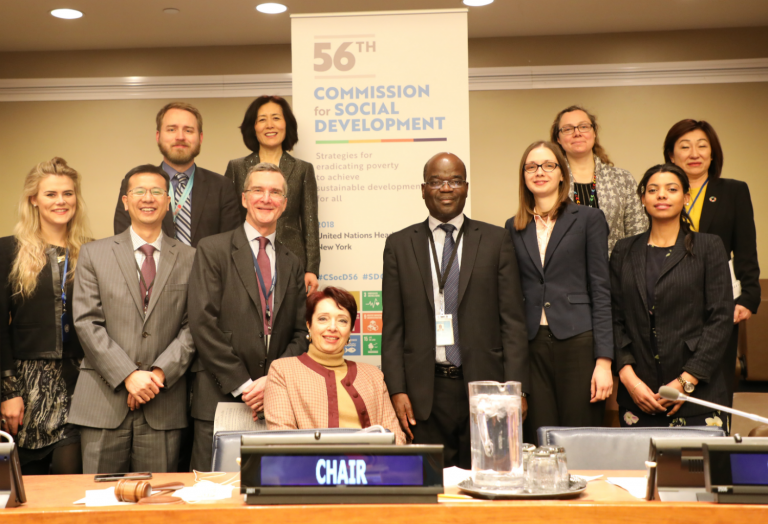
This year’s UN Commission on Social Development (CSocD56) took place from 29th January to 7th February, and was concluded on the last day with the adoption of policies — including the establishment of nationally appropriate social protection systems — to be taken by government and the civil society to help the millions of people living in poverty and those in vulnerable situations.
While nearly 1.1 billion people have risen from extreme poverty since 1990, many are living barely above the poverty line of $1.90 a day. The vulnerable groups, which include women, children, youth, persons with disabilities, indigenous peoples, and older persons, suffer greater degrees of poverty. At present, there are an estimated 1 billion people with disabilities, 80 per cent of whom live in developing countries and face poverty, while in most countries, indigenous peoples have higher infant and maternal mortality rates.
“At the global level, we have experienced impressive reductions in extreme poverty,” said UN Deputy Secretary-General Amina Mohammed at the opening of the Commission. “Significant progress has also been made in improving access to education and healthcare, promoting the empowerment of women, youth, persons with disabilities, older persons and indigenous populations. However, the drop in extreme poverty remains uneven across regions, within countries and between various social groups.”
Under the theme “Strategies for the eradication of poverty to achieve sustainable development for all”, the 56th session of the UN Commission for Social Development saw over 600 representatives from civil society and government gather at the UN Headquarters in New York from 29 January to 7 February to discuss effective strategies to eradicate poverty, including through tackling inequalities, and ensuring all segments of the population have access to basic services, including safe water and sanitation.
The 2030 Agenda for Sustainable Development, adopted in 2015 by world leaders, recognizes that sustainable development can only be achieved with the eradication of poverty.
At the Commission, the importance of creating productive employment and decent work for all, investing in people’s capacities and skills, and the development of a socio-economic framework were highlighted as effective strategies for ending poverty. Participants also advocated for social protection systems as critical to reducing poverty, tackling inequality and promoting inclusive economic growth.
At present, only 29 per cent of the global population are covered by comprehensive social security systems that include the full range of benefits from child and family benefits to old-age pensions.
“Since the 1995 World Summit for Social Development, this Commission has been a vital global platform for sharing good policies and practices, and exchange of information and knowledge and innovative social policies and development, aimed at eradicating poverty, combating inequality, fostering job creation, investing in education and health, and scaling up the provision of social protection,” stated UN Under-Secretary-General for Economic and Social Affairs Liu Zhenmin in his opening remarks at the Commission.
Countries will discuss the best ways of reducing the growing distance between the “haves” and the “have‑nots” at the Commission’s next session, which will open early next year with the theme “Addressing inequalities and challenges to social inclusion through fiscal, wage and social protection policies.”
"Reducing inequality has clear social and economic benefits, it strengthens people’s sense that society is fair and improves social cohesion and mobility,”said Nikulás Hannigan, Chair of the Commission’s 56th session, in his closing speech.
The Commission also featured four high-level panel discussions on issues ranging from strategies to eradicate poverty, to ageing, disabilities and the impact of new technologies on development. Presenting cutting-edge research by top experts from around the world, these panels helped countries take informed decisions, as they adopted draft resolutions of the Commission.
For more information about the CSocD56, please visit: http://bit.ly/un-csocd56
Did you miss the CSocD56 discussions? Follow our YouTube channel to watch the archived webcasts.
Source: UN DPI and UNDESA
 Welcome to the United Nations
Welcome to the United Nations